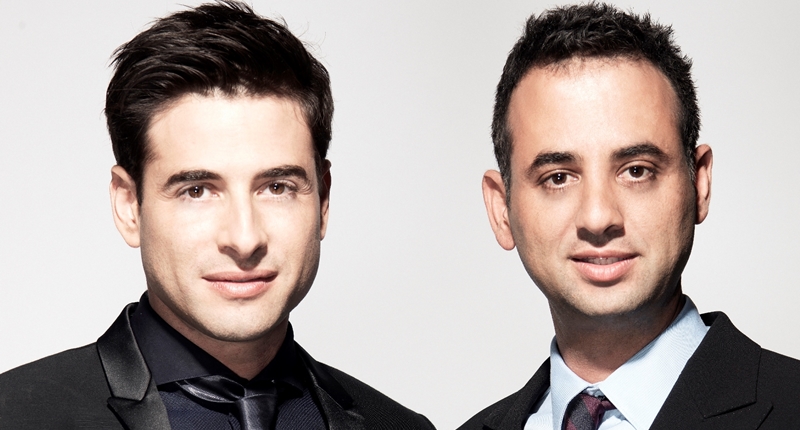Have you ever wondered how much easier travel has become, thanks to the digital innovations shaping our world? Exploring new destinations used to mean…
Inside the legal battle between Ran Neu-Ner vs Gil Oved, Romeo Kumalo

Former Vodacom executive Romeo Kumalo and one time Shark Tank presenter Gil Oved are at the centre of a legal battle, in which the pair’s former business partners allege that the two cut them out of a multi-million rand Vodacom deal.
The allegations form part of an ongoing legal dispute launched against Oved and Kumalo in November last year by Oved’s former business partner, Creative Council co-founder Ran Neu-Ner (pictured above, right with Oved), and Kumalo’s former friend, former Supersport CEO Happy Ntshingila (see this story).
Kumalo and Oved do not dispute that the four agreed to form a consortium in 2016 to pursue various business opportunities — but argue instead in a responding affidavit that the only earnings the two are entitled to relate to an acquisition deal involving the purchase of an equity stake in multinational Channel Vas — which they say never came off.
The multinational company — which has offices in Dubai and Athens — subsequently won a multi-million rand tender in December 2017 to supply loaned airtime and data to Vodacom pay-as-you-go customers.
Ran Neu-Ner and Happy Ntshingila allege that Romeo Kumalo and Gil Oved cut them out of a multi-million rand Vodacom deal.
Neu-Ner alleges that the four worked together to buy shares in Channel Vas and when this fell through, Oved and Kumalo put the shares in Kumalo’s wife Basetsana’s company, Basetsana Women Investment Holdings (BWIH) to achieve Black Economic Empowerment (BEE) woman status for Channel Vas’s SA subsidiary Nairtime — and other parts into a company called LLH — cutting out Neu-Ner and Ntshingila.
Neu-Ner further claims that in the dealings with himself and Ntshingila, Oved and Kumalo made an effort to exclude the two and to keep them away from any dealings as they were likely planning to do this from the beginning.
Neu-Ner and Ntshingila want the court to declare that the consortium the four set up (under the name “RGRH”) is rightfully entitled to all revenue derived from any shareholding that Oved and Kumalo have by way of all such shares in Channel Vas and various other entities tied to the investment in the multinational firm.
These he names as Nairtime SA or Nairtime EMP, BWIH, BWIH Media and LLH Capital — all of which are named as respondents in Neu-Ner’s affadivit.
‘We didn’t put shares in BWIH’
Kumalo and Oved however deny they put their shares in BWIH and argue that this was a separate BEE deal in which they weren’t directly involved in.
Kumalo says one of the pre-conditions for winning the Vodacom bid was to have a BEE partner. Explains Kumalo: “So, they approached my wife who is an entrepreneur in BWIH, to be a partner in that business — and so it’s not our share”.
In a responding affidavit (a copy of which Ventureburn has seen) BWIH director Basetsana Kumalo says her company is not a member of the consortium and was not party to any agreement concluded between any of the parties or that her company owns any shares in Channel Vas.
Oved pointed out that BWIH was not involved in the pitch for the Vodacom deal and added that he and Kumalo have “absolutely nothing to do with” Nairtime selecting BWIH as a BEE partner.
In a separate responding affidavit Nairtime SA director Shiv Bhagwan Falod said neither Nairtime or Nairtime Empowerment has “received or will receive revenue shares consequent upon the award of the Vodacom contract”.
Turning point
The turning point appears to have come in late 2017.
Kumalo adds that in an agreement with Oved on 11 September 2017, Neu-Ner specifically asked to be excluded from any further dealings involving the consortium, bar the planned equity acquisition in Channel Vas. At the time the acquisition looked very likely to come off, said Oved and Kumalo.
“Ran had lost interest for a while in what we were looking to do,” said Oved. “His focus had moved away from South Africa. He decided he would emigrate. He got the new show on CNBC and basically his focus became all about crypto and that wasn’t our interest and nor was it our focus.
“Our focus, as we had decided a year earlier was in tech and telecoms businesses in Africa. And it was in private equity, it wasn’t in startups, it wasn’t in crypto, it wasn’t in ICO, it wasn’t in bitcoin and we weren’t looking to trade. So, you know our interests completely diverged.
“He was planning his exits from the country and from us and it showed because while a year earlier he was very active, looking to bring deals to our consortium, he stopped doing that and he stopped giving the time which is necessary when you are building a business,” said Oved.
Kumalo said that on 11 September shortly after his meeting with Oved, Ner messaged him requesting a meeting and making it clear that the purpose of the meeting was to discuss “the parting of ways and delineate ‘a way forward where I won’t be part of your consortium and concerns’.”
Subsequent to the meeting on 11 September, Kumalo said he met with Neu-Ner on 13 September at Bellini’s in Johannesburg, where it was agreed that Neu-Ner would set up a special purpose vehicle (SPV) for the Channel Vas acquisition, should it come off. The SPV is named RGRH.
Writes Neu-Ner in his affidavit: “I was not unhappy with such an arrangement as I suspected that LLH was too ambitious and unsustainable a venture. I had also developed misgivings about Kumalo’s integrity and was reluctant to expand the sphere of our common commercial interests.”
PIC bid fails
The consortium’s planned acquisition deal did not come off, after the consortium’s bid to gain about R80-million in financing from the Public Investment Corporation (PIC) failed.
This, after the PIC’s investment committee in December 2017 rejected the deal, partly because it felt the deal would be too risky.
The Nairtime deal was signed in December 2017, the same month that the PIC’s investment committee decided to reject the deal.
In April last year, Oved said Neu-Ner asked to talk about the revenue opportunity in Channel Vas. “We were like, ‘it’s got nothing to do with you’,” said Oved. “He said, no actually when I said CVAS (Channel Vas) I meant everything, which he knows and we know, and it’s very clear, is bullshit.”
Oved points out that this had all come during the middle of crypto winter, when the price of bitcoin had plummeted. “All of a sudden it’s another story and he’s come to get something he knows he doesn’t deserve,” added Oved.
Ethos beats consortium to stake
When the PIC turned them down Channel Vas opened the acquisition to other parties. The 20% stake was acquired by SA private equity fund Ethos, which announced in November last year in a statement that it had invested R700-million to acquire the stake.
Despite the deal falling through, Kumalo and Oved said they continued to pursue a further acquisition of five percent (which would have equated to $300-million), despite Neu-Ner and Ntshingila having served the two with legal papers.
“That opportunity of getting further equity, he was still an equal shareholder, we never denied that of him. Because it was part of the Channel Vas acquisition. He was actually cutting his nose to spite his face, that was the irony,” said Oved.
Oved said Neu-Ner later sent a copy of his affidavit to Ethos, causing Oved and Kumalo to request that Neu-Ner send a letter to one of the consortium’s potential funders to say there was “no dispute” on the Channel Vas acquisition.
“Understand this, the guy is sitting in New York, doesn’t live here anymore. His view, how he sees the world, is that he’s no longer in South Africa, I’m getting a Greencard — I think he’s pursuing a Greencard, he wants to live there, that’s what he told me — and South Africa as far as he’s concerned is trash, the country’s is going down, the economy is going down and he’s emigrated so whatever happens, his reputation, doesn’t matter,” said Kumalo
LLH Capital
The four also had another entity, LLH. Explains Oved: “Basically we had another entity which we kept as our operating equity, which at the time was called LLH,” he said.
Oved and Kumalo explained that the entity can’t be confused with the brand name LLH Capital which they are currently raising capital for using the registered entity King Supreme of which Kumalo and Oved are the only directors. “It’s an operating entity while we raise capital for LLH,” explained Oved.
In November last year it emerged that Kumalo and Oved aimed to raise $200-million for a tech fund (see this story and this one).
Says Kumalo on why LLH was joined the Neu-Ner’s affidavit: “Everyone will tell you what Ran does well and Ran has a strategy of spray and pray, join everyone in (on legal case), go to the media and issue affidavits, everyone gets scared”.
Happy on not?
Neu-Ner was joined in his legal action by Ntshingila.
In his affidavit Neu-Ner says shortly after his meeting with Kumalo in September 2017, Kumalo and Ntshingila held an unpleasant meeting earlier that day at Tasha’s restaurant in Bryanston, Johannesburg.
“The meeting was used as an opportunity for Kumalo to tell Ntshingila that he regretted his ‘mistake’ in getting into business with a friend. In Kumalo’s assessment, Ntshingila had made no contribution either to pursuing the Channel Vas,” writes Neu-Ner in his affidavit.
Neu-Ner said at the meeting it was resolved that Oved and Kumalo would be the major shareholders in LLH, with
Ntshingila “deserving” only a five percent interest and one Brett Nagel receiving an undisclosed stake.
While Ntshingila declined to comment on the case when contacted by Ventureburn last week, Kumalo claims Neu-Ner roped him in as part of the case.
“Happy and I were trying to do a deal, which initially he was keen to do, but Ran roped him in and they decided to be two partners in the litigation. I saw Happy on Sunday, we play golf with the same team,” said Kumalo.
Kumalo pointed out that he’s in the same social circle as him. “Are we friends today, as in close friend, no we’re not. But do we see each other, do we talk to each other, of course. It’s very cordial,” said Kumalo.
Settlement talks
Kumalo met Neu-Ner at Harvard University in March when the two were still attending a course.
“I agreed to meet with him. He asked for the meeting. So, I met him and he says ‘Romeo let’s settle the matter, there’s no point in us fighting, we’re spending money with lawyers,” says Kumalo.
No settlement has been reached as yet between the parties.
Kumalo also stresses that the consortium hasn’t made any revenue. “We are still trying to negotiate. It’s not like we’ve cut him out, (or like) we’ve received his millions and it’s sitting in an offshore account, (or like) we have money in an offshore account — there’s nothing of the sort”.
Read more: Ran Neu-Ner confirms he’s taken legal action against Shark Tank’s Gil Oved, Romeo Kumalo [Updated]
Read more: LLH Capital’s Gil Oved, Romeo Kumalo mum on deals fund has concluded so far
Read more: Romeo Kumalo, Gil Oved to release details on $200m tech fund in Q1 of 2019
Featured image: Gil Oved (left), with former Creative Council partner Ran Neu-Ner

